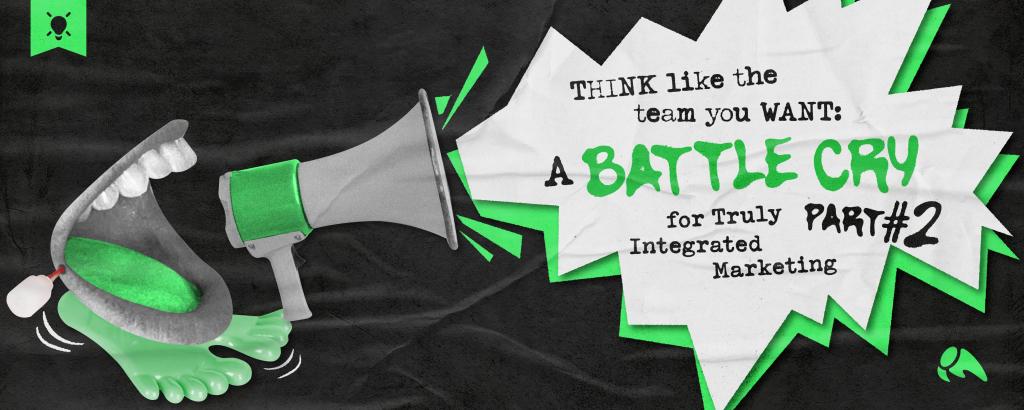The Internet allows your brand to push its message out to a broader audience more quickly and cheaply than ever before.
The more content you have available online, the more likely your brand will be seen by the audience for which your products or services are created.
And that’s great, as long as you have something to say. Something that:
- Is worth saying.
- Hasn’t already been said 1000x times.
- Is something you are ready to back up, defend and expand upon.
But too often, that’s not what your attempt at content marketing is doing. Not at all. Instead, you’re adding to cluttered Internet search results all offering the same weakly argued, barely researched, borderline unnecessary posts.
And the result?
Your brand might be getting seen (and that’s a big “might”), but it’s not getting remembered. And it’s gaining no respect.
Velocity Partners, a London B2B content marketing agency, shared a slideshow late last year in an article titled “Crap. The Content Marketing Deluge.” With more than 219k views less than four months, you may have seen it.
The point that resonated with me the most? “People who ‘get’ content understand context and can actually produce things that audiences want to consume.”
Is there a reason you’re posting what you are? Can you explain the value beyond page clicks and web traffic? Is there a reason people should read it – and eagerly await your next post?
What do YOU bring to the content marketing table?
Does your title suggest you should be a Thought Leader in the industry?
Great. What are those thoughts? What have you learned from your experiences that specifically got you and your company where it is today? Don’t be generic. Tell us how you got to that particular corner office – and every hurdle you stumbled over on the way.
Tell us stories.
Tell us mistakes you made.
In detail, so you’re relatable and human and we, the ones who might want to replicate your success, can actually learn from your story.
Don’t present yourself as a Thought Leader without any unique thoughts.
Do your employees have stories to tell from their days on the job?
Or, based on their experience, knowledge to share with the rest of the industry that might provoke further conversations and information sharing?
Please, have them tell those stories. Don’t have them water it down to talk about hard work, long days and “The customer is always right.” Choose employee spokespeople you trust, and let them be specific. These honest stories will:
- Describe the customer experience people can expect from working with your company
- Showcase the expertise and knowledge your employees have accumulated that allows them to do their jobs well
- Reinforces your brand’s message of leadership, whether its a quality service or quality product
Do you want to share data that guides the practices of your company?
If you’re going to share it, own it. Infographics and videos analyzing data engage the viewer far more than text, but they’re all the more effective when the information comes from your own research.
Don’t borrow data of another organization, invest a bit of money into design, slap a citation at the bottom for the research and promote it as informative material worthy of your content marketing resources. Share what you have learned from your company’s own research, development, sales and customer feedback. Invest in your company by investing in that research.
Why Regurgitated Content is a Waste of Everyone’s Time
You can write the same generic content as everyone else.
And it might cause some additional web traffic to trickle in.
And maybe a few comments under your blog or a share here and there on a social network.
But it doesn’t make you a leader. It doesn’t show you are thinking outside of the box. It doesn’t start any new conversations, spur any growth or innovation in your industry, or make people think of you as the Go-To Person for insight on breaking subjects.
Am I being a hypocrite right now?
You’re right. Arguments against regurgitated content aren’t uncommon.
So here’s my little story, my argument, as the one in charge of editing many an expert post.
I, like your audience, want to read something new. And I say that, not only as a branding and content strategist, but also quite often as a member of your actual target audience.
I spend time on the phone with you.
I sit in early morning in-person meetings with you, where laughs are shared, chats about the weekend and the craziness of your industry occur and coffee is sipped for 15 minutes before we even consider getting down to any formal business.
And I don’t tolerate seeing that fun, real life side of your business – that “You won’t believe what happened” story that gets shared with me – not making it to print.
I’m sure you can come up with 5 Tips and 10 Tricks and 17 Reasons Why but what good are those if the readers have no other reason to trust or believe your brand?
As Alexander Jutkowitz pointed out for Advertising Age, your content marketing should focus on good storytelling.
“Content marketing is not a shallow advertisement, a blatant self-promotion or an attempt to trick readers.”
His article also points to Condescending Corporate Brand Page, which can provide you with plenty of ideas for what not to do, such as treat your fans and followers like the they’re “barking seals.”

Share what makes your company special. Let me help you share with all of us what you know, beyond platitudes.
It’s more exciting for all of us.







